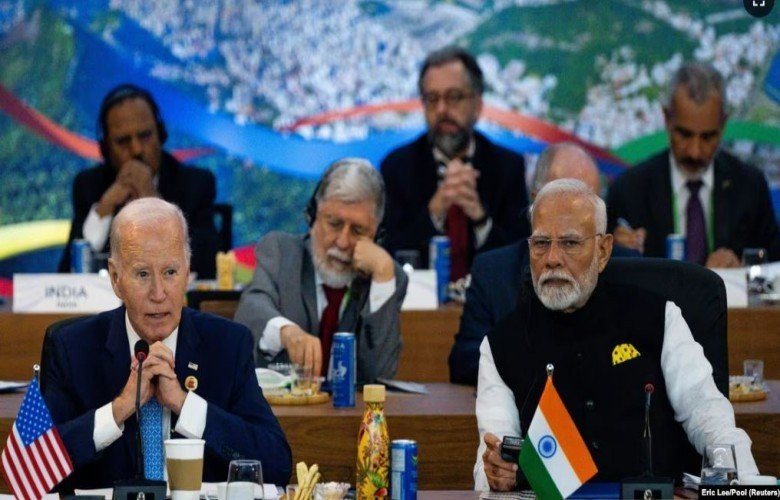With just two months remaining in President Joe Biden’s term, the United States is intensifying its financial, military, and diplomatic support for Kyiv’s efforts to defend against Russian aggression.
At the G20 summit in Rio de Janeiro, Brazil, where President Biden and the leaders of the world’s 20 largest economies are convening, U.S. officials are pushing for “the strongest possible language” in support of Ukraine. This was confirmed by Deputy National Security Advisor John Finer during a media briefing on Monday.
Western diplomats have renewed calls for harsher criticism of Moscow following Russia’s weekend airstrike, the largest on Ukrainian territory in recent months. They have also warned that Russia’s escalating war efforts could have destabilizing effects beyond Europe.
Earlier this month, the U.S. and Ukraine announced that North Korea has sent over 10,000 troops to assist Moscow in reclaiming territory previously controlled by Ukraine in Russia’s Kursk region.
The joint final declaration of the G20 leaders is still under negotiation. However, a draft seen by Voice of America and other circulating versions suggest it will include only general statements emphasizing UN principles and the need to uphold peace in Ukraine and Gaza.
Finer acknowledged the difficulty of reaching consensus on global conflicts due to the composition of the G20, which includes not only the G7 nations with relatively unified positions but also Russia, China, and developing countries.
“We’ll see how it goes,” he said.
Since the 2022 G20 summit in Bali, held months after Moscow’s aggression against Ukraine began, the global group has faced challenges in formulating a unified response to the conflict.
Authorization of Long-Range Missiles
The U.S. has increased military aid to Kyiv, including reportedly authorizing Ukraine to use American-supplied long-range missiles to strike deep within Russia. Media outlets citing anonymous officials reported the development.
Finer did not confirm this but said it aligns with the U.S. approach of tailoring its response to developments on the ground, allowing Ukrainians “to continue defending their territory and sovereignty.”
On Monday, Kremlin spokesman Dmitry Peskov stated that if the reports are true, such authorization would mark “a new round of tensions and Washington’s deeper involvement in the Ukraine conflict.”
Last week in Brussels, U.S. Secretary of State Antony Blinken sought to reassure European allies of Biden’s commitment to ensure every available dollar for Ukraine is utilized by January 20, when President-elect Donald Trump is inaugurated.
Trump has criticized the use of American taxpayer funds to support Kyiv. Without detailing his plans, he has often claimed he could quickly end the war even before assuming office—raising concerns in Europe that this might involve pressuring Ukraine to cede territory.
Earlier this month, Ukrainian President Volodymyr Zelenskyy stated that he seeks a “just conclusion” to the war, noting that a quick resolution would mean defeat. On Saturday, he told Ukrainian public radio that under a Trump administration, “the war would end more quickly,” though he added, “This is their approach, their promise to their country.”
Climate Change and Poverty Reduction
Brazil, the host of this G20 summit, has sought to shift the focus of discussions away from global conflicts and toward issues raised at the UN Climate Conference in Azerbaijan, as well as accelerating efforts to combat global hunger and poverty—a cause championed by President Luiz Inácio Lula da Silva.
Lula’s resistance to pressure from the G7 and other G20 members regarding Ukraine and Gaza reflects Brazil’s strategy of pursuing multiple objectives in an increasingly fragmented global landscape, said Bruna Santos, director at the Brazil Institute of the Wilson Center.
However, “neutrality risks leaving all sides dissatisfied in an increasingly polarized world,” Santos noted.
In addition to divisions over global conflicts, negotiators in Rio are struggling to reach consensus on language regarding funding for climate efforts, according to diplomatic sources who spoke anonymously with Voice of America about ongoing negotiations.
Western countries have pressed China and wealthy Middle Eastern nations to join in contributing to global climate funds—a proposal met with resistance from Brazil and other nations in the so-called Global South, which comprises developing countries.
Another Lula proposal—a 2% tax on the super-rich, which Brazil claims could generate up to $250 billion annually to assist the world’s poor—has also faced pushback.
Argentina’s right-wing president Javier Milei dismissed the proposal after visiting Trump at his Florida residence, becoming the first foreign leader to meet with the president-elect.







